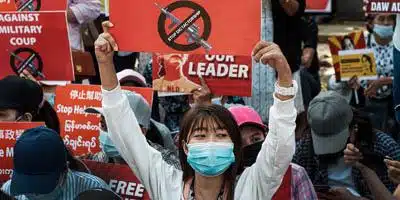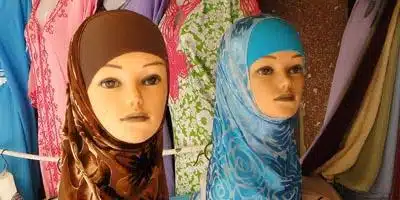“I don’t believe that the sanctions have been effective enough. They have tightened a little bit the grip on the regime, but the regime is still functioning. They’re doing whatever they want. They’re still detaining people. There’s still no release of prisoners.”
Noha Alkamcha
The economic sanctions on the Syrian government were set up in 2019 by the United States in efforts to limit violence against civilians and hold the regime accountable for its crimes. As Syria enters its 11th year of conflict, the economic sanctions added another layer of challenge on civilians facing an unprecedented famine, territorial division and lack of support systems. Unsurprisingly, women, girls and any already marginalised groups pay the highest price.
Women and girls – twice victims
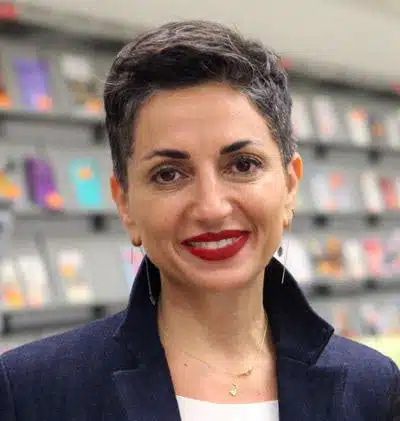
Lina AbiRafeh, executive director of the Arab Institute for Women at the Lebanese American University in Beirut, says that “for women and girls, the emergency is just beginning. Because the long-term impacts – on their health and wellbeing, their access to economic opportunities, their participation, their mobility, their freedom, their choice, their voice and on violence against women, which is the most deleterious impact – are huge and will continue for years, even after sanctions are lifted.”
Economic sanctions destabilise an already unstable country. The threat goes beyond economic consequences, AbiRafeh told me.
“What happens is when people lose lives, livelihoods, stability, social safety nets, anything on which they anchor, unfortunately, women and girls bear the brunt because violence against women increases.
“Will we see an increase in sexual violence? Absolutely. Trafficking and forced prostitution, for sure. Transactional sex, definitely. Intimate partner violence also. And for girls specifically, being taken out of school and denied opportunities, married much younger, sometimes sold off, these are all things that we see over and over in every single country. And we’ll see it again now.”
Ultimately, sanctions punish people who are already victims of a patriarchal society, a decade of war, destruction of infrastructure, and the health and economic consequences of COVID-19.
The sanctions

Noha Alkamcha is the Senior Program Manager for the Global Network and Regional Engagement team at Vital Voices, an NGO promoting women’s empowerment in Washington D.C. She thinks that even though these are not the first sanctions on Syria, they are the most brutal on civilians. “The sanctions supposedly target the Syrian government and personnel, like freezing the Syrian central banks assets,” she says. “In reality, there is slight damage that was done on those personnel, but it’s very, very minimal.”
Bank over-compliance
Maria Al Abdeh, executive director of Women Now for Development, a Syrian NGO based in Paris, says the main issue is over-compliance with the sanctions by banks. The sanctions affect people and humanitarian organisations even outside of Syria as it has become difficult to send money inside of Syria and even in neighbouring countries, she says. “If you have the name Syria on any bank transaction, or if you are a Syrian national, the transaction could be impacted, could be deleted. Your bank account could be closed sometimes.”
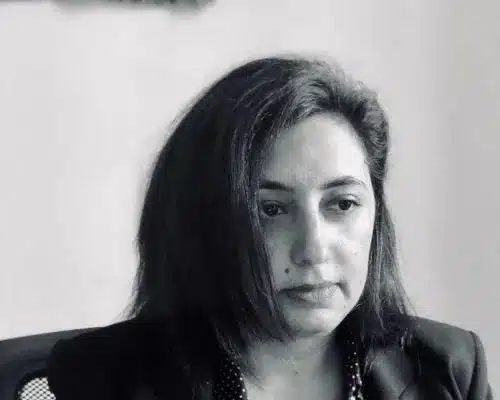
As such, some NGOs have resorted to cash transactions to Syria but “if you are talking about a large humanitarian aid, then you are using systems which could be not trustful sometimes and very complicated,” Al Abdeh said.
The financial constraints are putting a strain on feminist organisations. “Our budget is very small in comparison with big humanitarian organisations,” Al Abdeh said. “No one will really care. We are not a big client, you know, we are not discussing millions. Sometimes women’s initiatives inside Syria run for $2,000. It’s not an amount that is attractive for negotiations, to allow us to do things.”
What is the government doing?
A 2020 Carter Centre report notes that oppressive rulers, when faced with economic sanctions, “are more likely to counter sanctions by adopting more severe policies” and thus are “less concerned for the population’s needs.” In Syria, previous sanctions brought the development of informal or black markets in which government officials are making a profit.
For women and girls, it means having to resort to riskier means of economic survival. “The increase of women in the informal economy leads them to taking more risks in order to feed themselves and their families, to transactional sex, to increase in trafficking and forced prostitution,” AbiRafeh said.
Lack of a support system
Sanctions worsen an already weak support system for women, both legislatively and societally, AbiRafeh said. “It’s those kinds of contexts where, even on a good day, there are hardly any systems and services and support. There isn’t enough legislation to protect women. And even if there is, it’s incomplete, it’s unapplied, it’s ignored.”
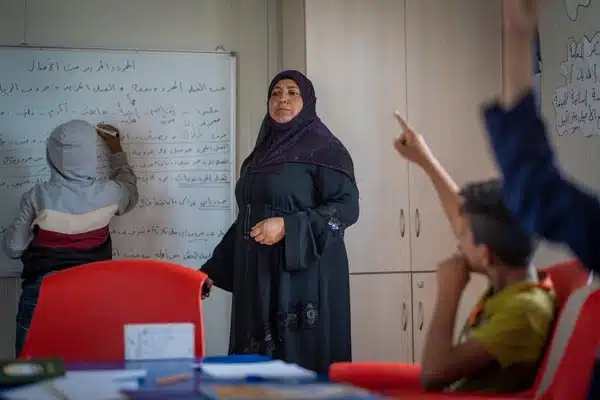
“The law doesn’t protect women in Syria,” she said. “And it often makes things worse. So the risks end up being greater than the benefits for women and girls.” Issues such as domestic abuse are regarded as a private matter.
“There’s cultural stigma, women risk being further ostracised, they risk losing their children if they try and seek support. There is a lot at stake. So very often women are just forced to endure the violence and tolerate it. Even when they know that it is a crime. They have no choice because the risks far outweigh any perceived benefits of leaving or seeking shelter or protecting themselves.”
Local women’s organisations and NGOs are usually the best resources for women and girls victims of violence. But with sanctions weighing down on the economy, their budgets are usually the first cut along health programs. “Anything that is on the so-called softer side tends to generally be cut. When countries are dealing with the economic impact of sanctions, they’re basically reducing their lives and their existence to what is necessary. And those things are never deemed to be necessary, even if they are, even if they are lifesaving, they are not viewed as important,” AbiRafeh said.
What’s next for women and civil society
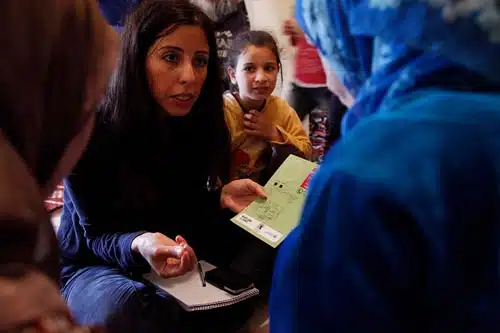
Al Abdeh described how, from a humanitarian perspective, the focus is on damage control. What is urgent today, in the context of a corrupt government, divided and broken down, is fighting what she calls “the malfunctions of the sanctions.” They have made sending money into Syria incredibly complex and thus harder for women, girls and civil society in general to rely on the international community for protection and resources.
“It’s a question of survival,” AbiRafeh said. “How to keep women safe. How to keep them from having to resort to risky measures of survival. How to help them to access any economic opportunity, to generate an income in a way that is safe and secure for them, that will make them, hopefully, less likely to put themselves at risk, less likely to marry off their daughters, less likely to pull their daughters out of school. These things will have generational impacts. So right now it’s a question of getting money into the hands of the women who will use it to protect themselves and their daughters.”
Yet, despite the barriers to resources and protection women face, and there being no sign of reunification in the short term, Syrian civil society is still fighting for the consideration of a collective vision and dialogue.
“It makes me very pleasantly surprised that it is an initiative that is constantly led by women’s organisations or feminist organisations,” Alkamcha told me. “There is a huge transformative impact that grassroots and feminist organisations have had in Syria. They undergo a lot of training and capacity building on good governance and democracy concepts, and they integrate it within communities that they are serving in preparation for that next phase, which we don’t know what it might look like yet.”
All photos copyright use Creative Commons 4.0

